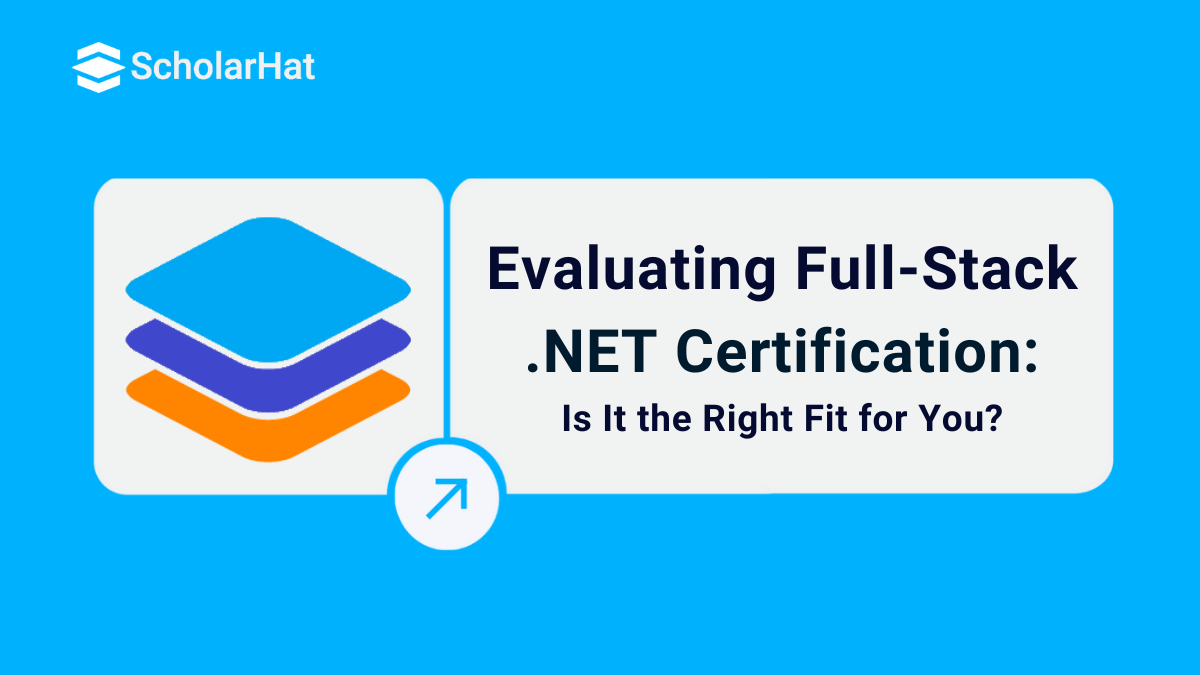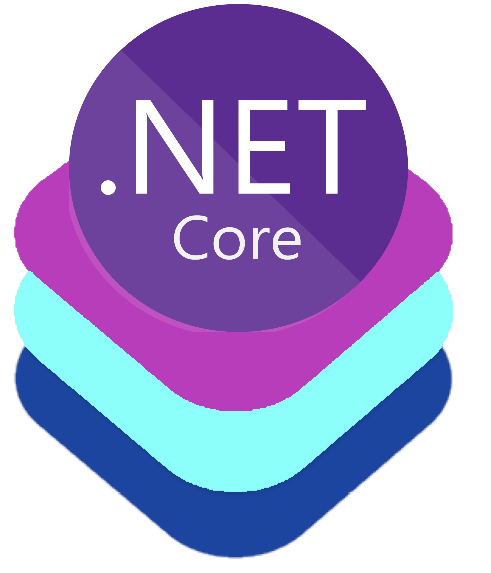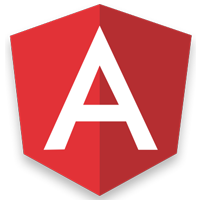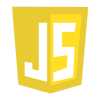18
AprIs a Full-Stack .NET Certification Right for You?
Pursuing Full Stack.NET certification
Pursuing a Full Stack .NET certification may be an excellent choice if you're looking to make a career in software engineering. This certification upgrades you with core skills in both front-end and back-end technologies. It will make you a versatile professional in .Net development. As you know With the increasing demand for full-stack developers, obtaining this certification can open up various job opportunities for you.
So, In this Full Stack tutorial, we will analyze Is pursuing a Full Stack.NET certification is the choice for you or not.
Read More - Full Stack .Net Developer Salary in India
Understanding Full Stack.NET Development
Full Stack.NET development involves working on aspects of software development ranging from designing user interfaces (UI) to handling server-side logic and managing databases. The.NET framework, created by Microsoft provides a range of tools and libraries that aid, in developing applications like web-based, mobile, and desktop applications.
Necessary technologies, in the .NET ecosystem, are as follows:
- ASP.NET Core: A versatile framework designed for developing cloud-based web applications.
- C#: An object-oriented programming language widely utilized in.NET development.
- Entity Framework: An object mapping (ORM) tool that streamlines data access and manipulation processes.
- Azure: Microsoft's cloud computing platform offering services, for application hosting, management, and scalability.
Exploring Full Stack.NET Benefits of Getting Certified
1. Enhanced Skillset
- Obtaining Full Stack.NET Certification equips you with a ranging skillset that encompasses both frontend and backend development. You will acquire knowledge in areas including:
- Frontend Technologies: HTML, CSS, JavaScript, and popular frameworks, like Angular or React.
- Backend Development: ASP.NET Core, C#, and building APIs.
- Database Management: Utilizing Entity Framework for database interactions and SQL Server for data storage.
2. Meeting Industry Demand
The use of .NET is prevalent among businesses that leverage Microsoft technologies. Companies seek developers who can proficiently navigate the development stack. Certification enhances your marketability. Unlocks opportunities in fields such as:
- Web Development: Crafting dynamic data-centric websites and applications.
- Cloud Computing: Creating and deploying applications on Microsoft Azure.
- Business Solutions: Developing scalable solutions for enterprises.
3. Advancing Your Career
Earning Full Stack.NET certification can boost your career trajectory whether you are embarking on a developers journey or aiming for roles. Certification showcases your expertise and dedication to mastering the.NET stack positioning you as an asset, to employers.
Roles and responsibilities of Full stack Dot Net developer?
- Design, develop, and test web applications by using HTML, CSS, and other technologies.
- Creating the front-end architecture of a website.
- Creating user interfaces for websites.
- Creating back-end applications for websites.
- Building databases and servers for functionality.
- Create and manage web applications with ReactJS,.NET Core, and other associated technologies.
- Utilizing an understanding of C#, ASP.NET, and MVC, perform application architecture and practical programming/development of web apps.
- Works with HTML5, CSS3, JavaScript, Bootstrap, Angular, Postgre SQL Entity Framework, Restful Web Services, Azure and AWS cloud solutions, and C#.
- Application of data protection and security Combining several data storage options
- To create a portal, develop and build web interfaces utilizing a variety of Microsoft technologies.
- Handle a range of data stream formats, such as CSV, XML, and JSON.
Top 9 skills required to become a full stack dot net developer?
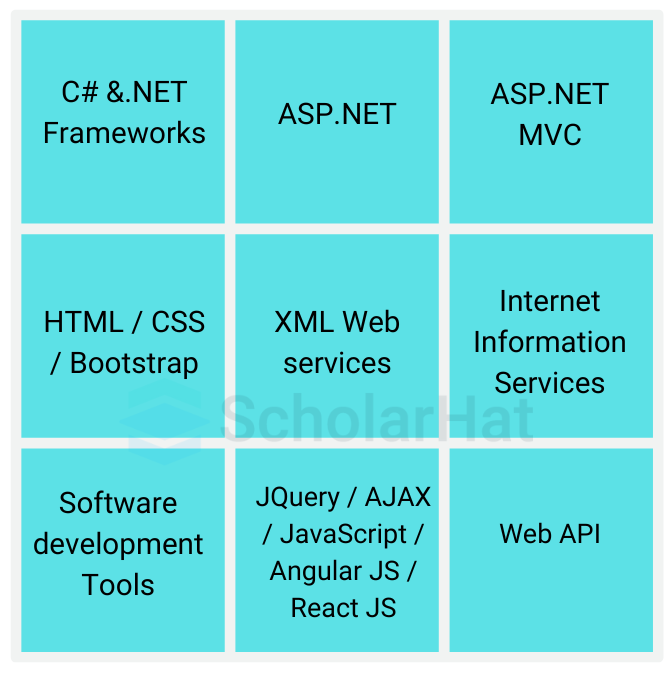
Important Considerations Before Certification
1. Assess Your Current Skill Set
If you already have a grasp of programming basics and some experience, in web development pursuing the Full Stack.NET certification can help establish your skills. However, if you're new to programming it might be beneficial to start with C and web development courses before delving into advanced topics.
2. Consider Your Learning Style and Engagement
Take into account your learning methods and the time you can dedicate to studying. Certification programs typically include courses, hands-on labs, and practical projects. Ensure that you are prepared to engage in the learning process as it may span months depending on your individual pace and background.
3. Align Your Certification with Career Goals
Choose a certification that aligns with your career objectives. If you're aiming for roles like stack developer, software engineer, or web developer obtaining a Full Stack.NET certification could be a career move. However, if you are exploring technologies or frameworks consider looking into certifications in those areas.
Steps for Achieving Full.NET Certification
1. Explore Certification Programs
Research reputable certification programs provided by Microsoft or trusted training institutions. Programs such, as Microsoft Certified:.NET Developer Associate or Microsoft Certified: Azure Developer Associate can offer credentials. You can take more information about the following certifications if you feel you could fit well in one.
| Best NET Full Stack Developer Certifications |
| Microsoft Certified: DevOps Engineer Expert |
| Microsoft Certified: Dynamics 365: Finance and Operations Apps Developer Associate |
| Certified ScrumMaster (CSM) |
| Professional Scrum Developer I (PSD I) |
| Oracle Certified Professional, Java SE 8 Programmer |
| Microsoft Certified: Azure Developer Associate |
| Certified Secure Software Lifecycle Professional (CSSLP) |
| AWS Certified Developer – Associate |
| Microsoft Certified: Azure Solutions Architect Expert |
2. Craft a study schedule
Develop a study plan that encompasses the following:
- Essentials: Enhance your comprehension of C and ASP.NET Core along, with the fundamentals of Web Development.
- Hands-on Practice: Engage in coding challenges to initiate small-scale projects. Contribute to open-source initiatives.
- Online Courses and Guides: Enroll in courses on platforms like Pluralsight, Udemy, or Microsoft Learn.
3. Practical projects
Engage in real-world projects that showcase your competencies. Construct applications that highlight your proficiency in managing both frontend and backend development integrating databases and deploying on cloud platforms. Hands-on experiences play a role in reinforcing learning and preparing for certification examinations.
4. Examination Preparation
Get acquainted with the exam objectives and study materials. Practice using sample questions to undertake tests. Review essential concepts. Many certification programs provide study materials and practice exams to help you evaluate your preparedness.
5. Community Engagement
Take part in forums coding communities and meetups centered around .NET development. Collaborating with peers and industry experts can offer insights, assistance, and networking opportunities.
.NET Future Trends
- .NET 6 Framework
- .NET Core Framework Security Features
- Azure Cloud
- Blazor Framework
- ML.NET 1.4
- Security with .NET Framework
- Xamarin development
- AI-enabled Chatbots
- ASP .NET Core Docker Feature
- MotionUI
Conclusion
So, Is Pursuing Full Stack.NET Certification Right for You? then obtaining a Full Stack .NET certification can significantly boost your skill set, unlocking other career prospects, within software development. If you have an interest, in developing cutting-edge applications find pleasure in using Microsoft technologies, and are dedicated to enhancing your knowledge this certification could be the fit for you. Also, consider our .net certification course for more understanding of front-end and back-end concepts.


